高中英语最实用语法一般过去时、现在完成时、将来完成时讲解和经典习题
初高中语法衔接八大时态基本结构(附练习题及答案)

初高中语法衔接八大时态基本结构(附练习题及答案)一般现在时态:主语+动词的一般现在式(注意三单)+其他成分例子:We study English everyday. He/She/Li Ping studies English hard. 一般过去时态:主语+动词的一般过去式+其他成分例子:We/He studied English last year.一般将来时态:主语+ will/ shall/am/is/are going to/ +动词原形+其他成分(about)to例子:We/He will study English next year.过去将来时态:主语+would +动词原形+其他成分例子:He told us that we would study English in 3 days.现在进行时态:主语+ am/is/are +动词的现在分词(v-ing形式)+其他成分例子:We are studying English now. he is studying English now.过去进行时态:主语+was/were+ v-ing形式+其他成分例子:We were studying English this time yesterday.He was studying English this time yesterday.现在完成时态:主语+ have/has done(动词的过去分词)+ 其他成分例子:We have studied English for 5 years.He has studied English for 5 years.过去完成时态:主语+ had done + 其他成分例子:He/We had studied English for 3 years before he/we enteredBo Luo Middle School.用动词的适当形式填空:1、He sometimes ___________(stay up) late into the night.2、In my opinion,eating too much junk food everyday _______(do) harm to our health.3、I ____________(lend) him my bike if he_________(take) good care of it.4、It _____(be) the custom to decorate the room before Christmas.5、We were playing cards when Mr. Black ________________(come in)。
高中英语语法复习讲义+训练:动词的时态(含答案)

中学英语语法复习讲义——动词的时态一. 概念:时态是英语谓语动词的一种形式,表示动作发生的时间和所处的状态.英语中的时态是通过动词形式本身的变更来实现的.英语有16种时态,但中学阶段较常用的有十种:一般现在时,一般过去时,一般将来时,过去将来时,现在进行时,过去进行时,将来进行时,过去完成时,英在完成时和现在完成进行时.二.相关学问点精讲1.一般现在时的用法1) 常常性或习惯性的动作,常与表示频腮度的时间状语连用。
时间状语:every…, sometimes,at…, on Sunday。
例如:I leave home for school at 7 every morning. 每天早上我七点离开家。
2) 客观真理,客观存在,科学事实。
例如:The earth moves around the sun. 地球绕太阳转动。
Shanghai lies in the east of China. 上海位于中国东部。
3) 表示格言或警句。
例如:Pride goes before a fall.骄者必败。
留意:此用法假如出现在宾语从句中,即使主句是过去时,从句谓语也要用一般现在时。
例:Columbus proved that the earth is round. 哥伦布证明了地球是圆的。
4) 现在时刻的状态、实力、性格、特性。
例如:I don't want so much. 我不要那么多。
Ann writes good English but does not speak well. 安英语写得不错,讲的可不行。
比较:Now I put the sugar in the cup. 把糖放入杯子。
I am doing my homework now. 我正在做功课。
第一句用一般现在时,用于操作演示或指导说明的示范性动作,表示言行的瞬间动作。
其次句中的now是进行时的标记,表示正在进行的动作的客观状况,所以后句用一般现在时。
高中英语四大时态练习题

高中英语四大时态练习题高中英语四大时态包括一般现在时、一般过去时、一般将来时和现在进行时。
以下是针对这四种时态的练习题:1. 一般现在时(Simple Present Tense)- 用括号内动词的正确形式填空。
1) I _______ (go) to school every day.2) She _______ (not like) ice cream.3) The sun _______ (rise) in the east.- 根据上下文回答问题。
1) What does he usually do after school?2) When does the meeting start?2. 一般过去时(Simple Past Tense)- 用括号内动词的过去式填空。
1) He _______ (visit) his grandparents last weekend.2) She _______ (not finish) her homework yesterday.3) The movie _______ (start) at 7:00 PM.- 根据上下文回答问题。
1) What did you do last night?2) When did the concert begin?3. 一般将来时(Simple Future Tense)- 用括号内动词的正确形式填空。
1) I _______ (go) to the library tomorrow.2) They _______ (not attend) the meeting next week.3) The train _______ (arrive) at 10:30 AM.- 根据上下文回答问题。
1) What will you do this weekend?2) When will the event start?4. 现在进行时(Present Continuous Tense)- 用括号内动词的现在分词形式填空。
(完整版)高中英语八大时态总结及习题(2),推荐文档

高中英语八大时态全套精讲英语共有十六种时态,其表现形式如下(以study为例):时态 一般时进行时完成时完成进行时现在study be studying have studied have been studying 过去studied be studying had studied had been studying将来will study will bestudying will havestudiedwill have beenstudying过去将来would study would bestudying would havestudiedwould have beenstudying.1 一般现在时的用法1) 经常性或习惯性的动作,常与表示频腮度的时间状语连用。
时间状语:every…, sometimes, at…, on Sunday I leave home for school at 7 every morning.2) 客观真理,客观存在,科学事实。
The earth moves around the sun. Shanghai lies in the east of China.3) 表示格言或警句中。
Pride goes before a fall. 骄者必败。
注意:此用法如果出现在宾语从句中,即使主句是过去时,从句谓语也要用一般现在时。
例:Columbus proved that the earth is round..4) 现在时刻的状态、能力、性格、个性。
I don't want so much. Ann Wang writes good English but does not speak well.比较:Now I put the sugar in the cup. I am doing my homework now.第一句用一般现在时,用于操作演示或指导说明的示范性动作,表示言行的瞬间动作。
高中英语动词时态练习题及讲解
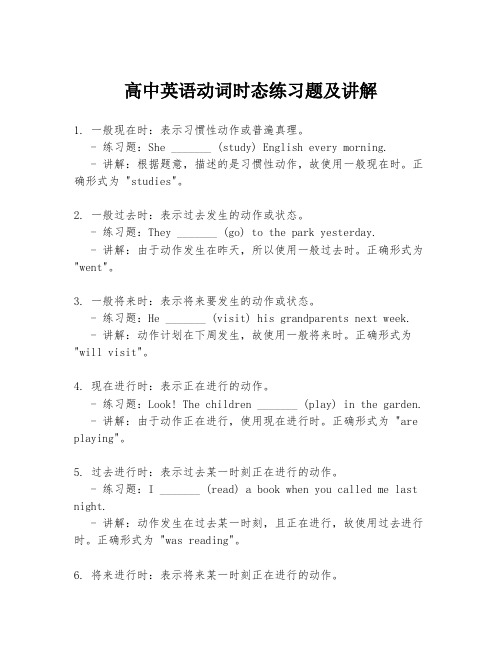
高中英语动词时态练习题及讲解1. 一般现在时:表示习惯性动作或普遍真理。
- 练习题:She _______ (study) English every morning.- 讲解:根据题意,描述的是习惯性动作,故使用一般现在时。
正确形式为 "studies"。
2. 一般过去时:表示过去发生的动作或状态。
- 练习题:They _______ (go) to the park yesterday.- 讲解:由于动作发生在昨天,所以使用一般过去时。
正确形式为"went"。
3. 一般将来时:表示将来要发生的动作或状态。
- 练习题:He _______ (visit) his grandparents next week. - 讲解:动作计划在下周发生,故使用一般将来时。
正确形式为"will visit"。
4. 现在进行时:表示正在进行的动作。
- 练习题:Look! The children _______ (play) in the garden. - 讲解:由于动作正在进行,使用现在进行时。
正确形式为 "are playing"。
5. 过去进行时:表示过去某一时刻正在进行的动作。
- 练习题:I _______ (read) a book when you called me last night.- 讲解:动作发生在过去某一时刻,且正在进行,故使用过去进行时。
正确形式为 "was reading"。
6. 将来进行时:表示将来某一时刻正在进行的动作。
- 练习题:She _______ (be) at a meeting at this time tomorrow.- 讲解:动作将在将来某一时刻进行,使用将来进行时。
正确形式为 "will be"。
7. 现在完成时:表示过去发生的动作对现在有影响或结果。
高中英语时态及练习

高中英语时态及练习一、一般现在时1、表示现在发生的动作或存在的状态,常与every day,once a week,in the morning,at present等连用。
例:They don’t usually have enough money to go to the movies.2、表示主语具备的性格和能力等。
例:Mary can speak three languages.3、表示经常性或习惯性的动作,常与always,never,sometimes,often等连用。
例:I never eat fast food.4、表示现在提出的建议或要求。
例:Could you please help me with my math homework?二、现在进行时1、表示正在发生的动作或存在的状态。
例:He is studying for his history exam.2、表示现阶段正在进行的动作,但这个动作不一定正在进行。
例:My brother is preparing for his college entrance exams.3、表示即将发生的动作,常与表示将来的时间副词连用。
例:We are about to start our journey.三、现在完成时1、表示过去发生的动作对现在造成的结果。
例:I have just finished my homework.2、表示过去开始一直持续到现在的动作或状态,并可能继续下去。
例:They have been married for 20 years.四、一般过去时1、表示过去某个时间发生的动作或存在的状态。
例:We saw a movie last night.2、表示过去经常或反复发生的动作。
例:He always went to the park in the morning.高中英语时态练习英语时态是英语语法中非常重要的一个部分,也是我们在学习英语过程中必须要掌握的知识。
高中英语最实用语法一般过去时、现在完成时、将来完成时讲解和经典习题

I. 一般过去时一般过去时:在过去发生的动作,现在已经结束。
基本用法:1.过去某个特定时间发生的动作或存在的状态。
表示过去时间的时间状语:last+时间、时间+ago、yesterday、just now、the other day、once upon a time、at that time、then2. 表示过去经常发生的动作或存在的状态,可与频度副词always、usually、often等连用。
表示过去的习惯性动作,除了用动词过去式外,还可以用used to do sth、would do sth3.表示说话人始料未及的事情I didn’t know it was you.I never thought you would bring me a gift.4.宾语从句时态:主现从、主过从5.表示已去世者的情况或过去的历史。
II. 现在完成时一.基本结构:助动词have/has+过去分词(done)二.句型:否定句:主语+have/has+not+过去分词+其他.一般疑问句:Have/Has+主语+过去分词+其他.简略答语: Yes, 主语+ have/has.(肯定) No, 主语+ haven't/hasn't.(否定)三.用法(1)现在完成时表示过去发生或已经完成的动作对现在造成的影响或结果I have spent all of my money (so far).(含义是:现在我没有钱花了.)Guo zijun has (just/already) come. (含义:郭子君现在在这儿)My father has gone to work.(含义是:我爸爸现在不在这儿)(2)现在完成时可以用来表示发生在过去某一时刻的,持续到现在的动作(用行为动词表示)或状态(be动词表示)常与for(+时间段),since(+时间点或过去时的句子)连用.①for+时段②since+过去一个时间点(译为:自从……以来)③since+时段+ago④主句(现在完成时)since+从句(一般过去时)→主完从过●⑤It is/ has been +时段+since+从句(过去时)Mary has been ill for three days.I have lived here since 1998.⑥It is + 第几次(the first time)that + 句子(现在完成时)四. has gone (to),has been (to), has been (in) 的区别Have/Has gone(to) :去了(现在不在说话现场)Where is your father?He has gone to Shanghai.Have/Has been (to) :去过(已不在去过的地方)My father has been to Shanghai.Have/has been in:呆了多久(还在所呆的地方)My father has been in Shanghai for two months. /since two months ago. 五.现在完成时的标志1. 现在完成时的含义之一是过去完成的动作对现在仍有影响,用以下四大标志词可以表达这种含义:* 以already, just和yet为标志He has already got her help. 他已得到她的帮助。
一般过去时。现在完成时。区别及练习题

一般过去时。
现在完成时。
区别及练习题精诚教育专注于中学生的教育。
现在完成时和一般过去时有所不同,它强调过去的动作对现在的影响,而一般过去时则强调动作发生的时间和地点,不涉及对现在的影响。
例如,她看过这部电影(现在完成时,强调已经看过了),她昨晚看了这部电影(一般过去时,强调时间是昨晚)。
现在完成时常与表示过去的时间状语连用,如already、yet、just、ever、never、before,以及“for+一段时间”、“since+过去时间/从句”等。
而一般过去时则常与表示过去时间的状语连用,如“一段时间+ago”、just now、yesterday、last week等。
例如,XXX在北京住了五年了(现在完成时,强调已经住了五年),五年前XXX住在北京(一般过去时,强调时间点是五年前)。
在现在完成时的常用句型中,结构中的从句部分要用现在完成时。
例如,这是女孩第二次迟到了(It was the second time that the girl had been late),这是我第一次游览长城(It is the first time that I have visited the Great Wall)。
另外,使用“Thisis the… that…”结构时,从句也要用现在完成时。
例如,这是我看过的最好的电影(This is the best film that I've ever seen)。
This is the first time I have XXX.1.A.用already或yet1) Have they taken down the old pictures yet。
No。
they haven’t yet.2) Most of us have already XXX.3) He said XXX.B.用since或for1) We have XXX term.2) Mrs Liao has been in hospital since last week.3) I have stayed at my aunt’s for two weeks.C.用have gone或have been1) Where are the boy students。
时态语态高中练习题及讲解

时态语态高中练习题及讲解### 时态语态高中练习题及讲解#### 练习题1. 一般现在时:请用一般现在时翻译下列句子。
- 他每天早晨跑步。
- 地球绕着太阳转。
2. 一般过去时:将下列句子转换为一般过去时。
- 我昨天去了图书馆。
- 他们去年在这个城市买了房子。
3. 一般将来时:使用一般将来时构造以下句子。
- 明天我会去看电影。
- 她下个月将会参加一个会议。
4. 现在进行时:根据给定的动词,构造现在进行时的句子。
- 她正在学习。
- 他们正在讨论。
5. 过去进行时:将下列句子转换为过去进行时。
- 昨天这个时候,我正在看电视。
- 昨晚,他们正在准备晚餐。
6. 现在完成时:使用现在完成时描述以下情况。
- 我已经完成了我的作业。
- 他们还没有到达。
7. 过去完成时:构造过去完成时的句子。
- 我到达的时候,电影已经开始了。
- 她告诉我她已经完成了她的报告。
8. 被动语态:将下列句子转换为被动语态。
- 他们正在建造一座新桥。
- 这本书是由著名作家写的。
9. 情态动词:使用情态动词表达可能性或能力。
- 他可能已经离开了。
- 她能够解决这个问题。
10. 条件句:构造条件句。
- 如果明天下雨,我们就不去野餐了。
- 要是我有时间,我会去参观博物馆。
#### 讲解1. 一般现在时:用来描述经常发生的动作或状态,以及普遍真理。
- He runs every morning.- The Earth revolves around the Sun.2. 一般过去时:用来描述过去发生的动作或状态。
- I went to the library yesterday.- They bought a house in this city last year.3. 一般将来时:用来描述将要发生的动作或状态。
- I will go to the movies tomorrow.- She will attend a meeting next month.4. 现在进行时:用来描述正在发生的动作。
高中英语时态总结(十六大类)及其配套训练

高中英语时态总结(十六大类)及配套练习英语时态分为16种:一般现在、一般过去、一般将来、过去将来时,以及这四者的进行时、完成时和完成进行时。
注:构成时态的助动词be (is, am, are), have (has, have), shall, will 等需根据主语的变化来选择。
1. 一般现在时A) 表示现在发生的动作、情况、状态和特征。
B) 习惯,兴趣,爱好等。
C) 经常性、习惯性动作。
He always helps others.D) 客观事实和普遍真理。
尤其要注意,如果前后文不是一般现在时,则无法保持主句、从句时态一致。
E) 表示一个按规定、计划或安排要发生的动作,(仅限于某些表示“来、去、动、停、开始、结束、继续”等的动词)可以与表示未来时间的状语搭配使用。
常见的用法是:飞机、火车、轮船、汽车等定期定点运行的交通方式。
The next train leaves at 3 o'clock this afternoon.How often does this shuttle bus run?F) 在时间和条件状语从句里经常用一般现在(有时也用现在完成时)表示将来事情。
When you have finished the report, I will have waited for about 3 hours.2. 现在进行时(be doing)用法:现在正在进行的动作。
3. 现在完成时(have done)A) 表示动作到现在为止已经完成或刚刚完成。
I bought a new house, but Imy old one yet, so at the moment I have two houses.A. didn't sellB. soldC. haven't soldD. would sellGreat as Newton was, many of his ideastoday and are being modified by the work of scientists of our time.A. are to challengeB. have been challengedC. may be challengedD. are challengingB.如何区分完成时态和过去时态①现在完成时是联系过去和现在的纽带。
高中时态题练习题及讲解
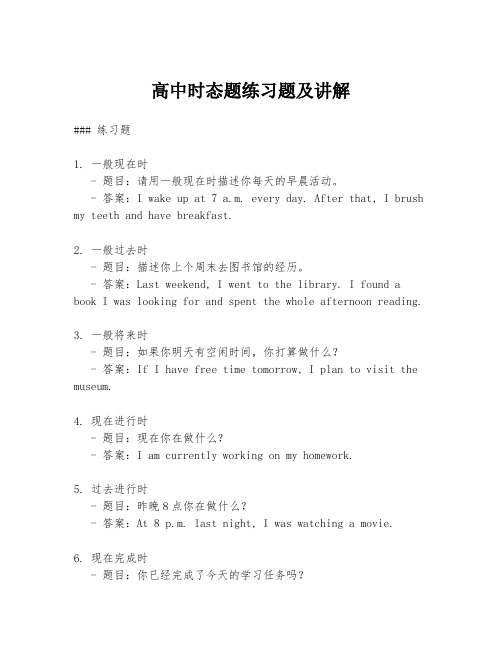
高中时态题练习题及讲解### 练习题1. 一般现在时- 题目:请用一般现在时描述你每天的早晨活动。
- 答案:I wake up at 7 a.m. every day. After that, I brush my teeth and have breakfast.2. 一般过去时- 题目:描述你上个周末去图书馆的经历。
- 答案:Last weekend, I went to the library. I found a book I was looking for and spent the whole afternoon reading.3. 一般将来时- 题目:如果你明天有空闲时间,你打算做什么?- 答案:If I have free time tomorrow, I plan to visit the museum.4. 现在进行时- 题目:现在你在做什么?- 答案:I am currently working on my homework.5. 过去进行时- 题目:昨晚8点你在做什么?- 答案:At 8 p.m. last night, I was watching a movie.6. 现在完成时- 题目:你已经完成了今天的学习任务吗?- 答案:Yes, I have completed my study tasks for today.7. 过去完成时- 题目:到你离开家的时候,你已经做了什么?- 答案:By the time I left home, I had finished my breakfast.8. 将来完成时- 题目:到本周末,你将完成多少作业?- 答案:By the end of this weekend, I will have finished all my homework.9. 现在完成进行时- 题目:你一直在做的事情是什么?- 答案:I have been studying English for the past three months.10. 被动语态- 题目:这本书已经被翻译成多种语言了吗?- 答案:Yes, the book has been translated into many languages.### 解析1. 一般现在时- 描述的是习惯性动作或普遍真理。
高中英语语法时态全国通用1-四种基本时态,讲解+习题
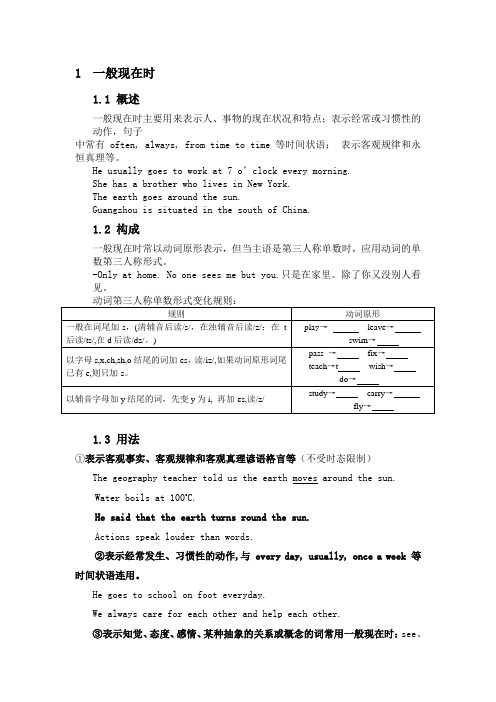
1一般现在时1.1概述一般现在时主要用来表示人、事物的现在状况和特点;表示经常或习惯性的动作,句子中常有often, always, from time to time 等时间状语;表示客观规律和永恒真理等。
He usually goes to work at 7 o’clock every morning.She has a brother who lives in New York.The earth goes around the sun.Guangzhou is situated in the south of China.1.2构成一般现在时常以动词原形表示,但当主语是第三人称单数时,应用动词的单数第三人称形式。
-Only at home. No one sees me but you.只是在家里。
除了你又没别人看见。
1.3用法①表示客观事实、客观规律和客观真理谚语格言等(不受时态限制)The geography teacher told us the earth moves around the sun.Water boils at 100o C.He said that the earth turns round the sun.Actions speak louder than words.②表示经常发生、习惯性的动作,与 every day, usually, once a week 等时间状语连用。
He goes to school on foot everyday.We always care for each other and help each other.③表示知觉、态度、感情、某种抽象的关系或概念的词常用一般现在时:see、hear、smell、taste、feel、notice、agree、believe、like、hate、want、think、belong、seem等。
英语时态讲解及练习

一般将来时
构成:①will,shall+动词原形,其中shall只用 于第一人称。②be going to +动词原形,表 示主观打算,按计划,安排要发生的事情。 ③be to +动词原形,表示客观安排 ④ be about to +不定式,意为马上要做某事,正 要做某事。⑤某些动词,可用进行时态表 将来,如come, go, arrive, leave。⑥在时间 状语从句和条件状语从句中,主句用一般 将来时(will+动词原形),从句中用一般现 在时表将来。⑦一般现在时可表示按时间 表发生的将来的动作(限start, begin, arrive, end, close, leave---等表示开始或移动意义的 词)
现在进行时
作谓语的动词用来表示动作(情况)发 生时间的各种形式称为时态。 1.概念:表示现阶段或说话时正在进行 的动作及行为。 2.时间状语:Now, at this time, days, look. listen等时间状语做标志。 3.基本结构:主语+be +doing +其他 4.否定形式:主语+be +not +doing+其他 5.一般疑问句:把be动词放于句首。
现在分词的变法有
1)、一般在动词词尾加上-ing ,E.g. jump 2)、以不发音字母e结尾的动词,先 去e,再加-ing. E.g have write 3)、.以重读闭音节末尾只有一个辅 音字母结尾的词,它前面是单个元 音字母时要先将词尾的辅音字母双 写,再加上-ing. E.g. sit put 其句式 变换都在be上做文章。
什么情况下用?
①表示经常或习惯性的动作或存在 的状态。②表示主语通常的能力、 兴趣爱好、和性格特征。③表示客 观的事实或真理。④表示按照时刻 表或已经计划安排好的将来行为。 (只限于是go, come, leave, arrive, begin, start, take off, stop, be等表示开 始或移动意义的词。)⑤在时间状 语从句和条件状语从句中,主句用 一般将来时(will+动词原形),从句 中用一般现在时表将来。(主将
一般过去时、现在完成时、现在完成进行时、将来完成时的用法及区别(知识梳理)

一般过去时、现在完成时、现在完成进行时、将来完成时的用法及区别真题再现1.—Is Peter coming?—No, he ____ his mind after a phone call at the last minute.A. changesB. changedC. was changingD. had changed2.In my hometown, there is always a harvest supper for the farmers after all the wheat______ cut.A. will have beenB. will beC. wasD. has been3.Despite the previous rounds of talks, no agreement _______ so far by the two sides.A. has been reachedB. was reachedC. will reachD. will have reached4.Mary ____ r eally hard on his book and thinks he’ll have finished it by Friday.A. workedB. has been workingC. had workedD. has worked5.The reason why prices ________ , and still are, too high is complex, and no short discussion can satisfactorily explain this problem.A. wereB. will beC. have beenD. had been6.I had a strong desire to reach in and play with the toy, but _____________ thankfully by the shop windowA. am held backB. held backC. hold backD. was held back7.—Where is Peter? I can't find him anywhere.—He went to the library after breakfast and _______________ his essay there ever since.A. wroteB. had writtenC. has been writingD. is writing8.To my delight, I __________ f rom hundreds of applicants to attend the opening ceremony.A. was chosenB. was being chosenC. would chooseD. had chosen9.—Did you enjoy the party?—Yes. We ___ well by our hosts.A. were treatedB. would be treatedC. treatedD. had treated10.I n the last few years, China ______ great achievements in environmental protection.A. has madeB. had madeC. was makingD. is making11.I wasn't able to hide my eagerness when I _________ , "What do you wish me to do now?"A. askB. have askedC. am askingD. asked答案与解析:1.B。
高考英语时态语态讲解及专练

1.时态的分类?语态分类?时态分为三层去记忆:现在时,过去时和将来时,然后再去细分。
语态有两种,主动和被动。
时态语态虽然并不难,但是很多同学还是无法做对题目,导致丢分。
其实,原因在于有些同学对时态语态的区分并不清楚,总是凭感觉去写。
或者,有些学生根本不知道学了哪几个时态语态,只是觉得自己都知道。
今天我们一起找一个简单的办法来记住高考里常考的时态语态知识要点,并了解提高做题正确率的做题方法。
首先,记忆时态语态要分为三层去记。
即:现在时;过去时和将来时。
在这三层里再去细分,就比较容易记忆了。
(不要按照什么一般时,进行时,完成时等这样的层次去记,容易乱。
)2.各个时态语态2.1 现在时分为:一般现在时;现在进行时;现在完成时;现在完成进行时2.1.1一般现在时动词形式为:do/does /am/is/ are 其被动表示:am/ is/ are + done含义:(1)表示经常性动作、习惯性动作,或存在的状态。
常与表示频率的副词或时间状语连用,比如:always,often, usually, sometimes, once a week, on Mondays…含义:(2)表示客观事实、普遍真理。
The earth goes around the sun.其他:If ,as soon as. when等引导的条件状语从句、时间状语从句--主将从现。
If it rains tomorrow, we won’t go to the park.Please tell him about it as soon as he comes back.There,here开头的倒装句中,用一般现在时表正在进行时。
A bus comes here.其他:一般现在表将来--飞机起飞,火车发车、电影演出开演等按照时刻表或按计划发生的事情,用一般现在时表将来,来表达其客观性,此时常用动词如leave, come,start,begin,go,come等。
高考英语十六种时态精讲及练习题附答案
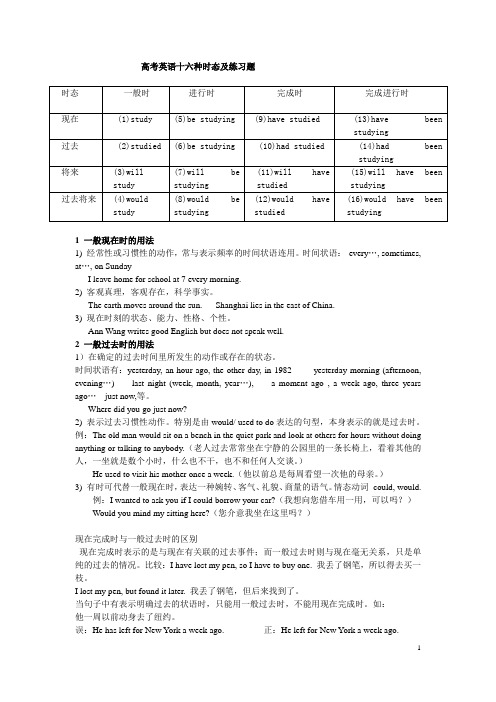
高考英语十六种时态及练习题1 一般现在时的用法1) 经常性或习惯性的动作,常与表示频率的时间状语连用。
时间状语:every…, sometimes, at…, on SundayI leave home for school at 7 every morning.2) 客观真理,客观存在,科学事实。
The earth moves around the sun.Shanghai lies in the east of China.3) 现在时刻的状态、能力、性格、个性。
Ann Wang writes good English but does not speak well.2 一般过去时的用法1)在确定的过去时间里所发生的动作或存在的状态。
时间状语有:yesterday, an hour ago, the other day, in 1982 yesterday morning (afternoon, evening…)last night (week, month, year…), a moment ago , a week ago, three years ago…just now,等。
Where did you go just now?2) 表示过去习惯性动作。
特别是由would/ used to do表达的句型,本身表示的就是过去时。
例:The old man would sit on a bench in the quiet park and look at others for hours without doing anything or talking to anybody.(老人过去常常坐在宁静的公园里的一条长椅上,看着其他的人,一坐就是数个小时,什么也不干,也不和任何人交谈。
)He used to visit his mother once a week.(他以前总是每周看望一次他的母亲。
英语时态中的一般过去时以及现在完成时讲解与练习
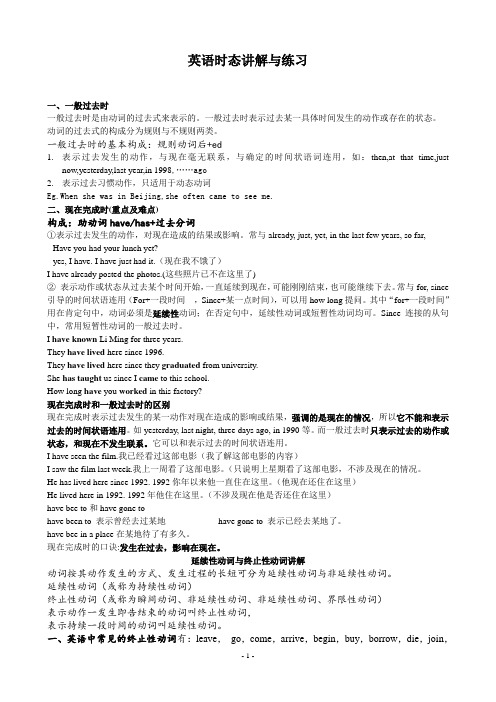
英语时态讲解与练习一、一般过去时一般过去时是由动词的过去式来表示的。
一般过去时表示过去某一具体时间发生的动作或存在的状态。
动词的过去式的构成分为规则与不规则两类。
一般过去时的基本构成:规则动词后+ed1.表示过去发生的动作,与现在毫无联系,与确定的时间状语词连用,如:then,at that time,justnow,yesterday,last year,in 1998,……ago2.表示过去习惯动作,只适用于动态动词Eg.When she was in Beijing,she often came to see me.二、现在完成时(重点及难点)构成:助动词have/has+过去分词①表示过去发生的动作,对现在造成的结果或影响。
常与already, just, yet, in the last few years, so far,--Have you had your lunch yet?--yes, I have. I have just had it.(现在我不饿了)I have already posted the photos.(这些照片已不在这里了)②表示动作或状态从过去某个时间开始,一直延续到现在,可能刚刚结束,也可能继续下去。
常与for, since 引导的时间状语连用(For+一段时间,Since+某一点时间),可以用how long提问。
其中“for+一段时间”用在肯定句中,动词必须是延续性动词;在否定句中,延续性动词或短暂性动词均可。
Since连接的从句中,常用短暂性动词的一般过去时。
I have known Li Ming for three years.They have lived here since 1996.They have lived here since they graduated from university.She has taught us since I came to this school.How long have you worked in this factory?现在完成时和一般过去时的区别现在完成时表示过去发生的某一动作对现在造成的影响或结果,强调的是现在的情况,所以它不能和表示过去的时间状语连用。
高中英语时态语态讲解及习题上课讲义

高中英语时态语态讲解及习题上课讲义时态与语态一.一般现在时,表示现在经常性、习惯性的动作和状态,常见的时间状语包括sometimes, often, usually, always,occasionally, now and then,on weekends,onSundays,every week/month/year等She always takes a walk in the evening.He often does his homework in his study.1.一般现在时表示客观真理、科学事实及自然现象和谚语格言中,此用法即使出现在过去语境中,也用一般现在时。
The moon goes around the earth.Pride goes before a fall.骄者必败He said the earth is round.2.主句是一般将来时,由when,after, before, as soon as, the minute,whenever等引导的时间状语和由if, unless, so long as, once等引导的条件状语和however,even if等引导的让步状语从句中一般用一般现在时表示将来。
如:l’ll go there after I finish my work.If it rains tomorrow,I won’t go there.I will tell her when she comes tomorrow.Even if it rains tomorrow, the sports meeting will take place.3.在以here,there开头的句子里,go,come等少数动词的一般在时表示正在发生的动作。
例如:There goes the bell.铃响了。
There comes the bus.汽车来了。
Here she comes.她来了。
- 1、下载文档前请自行甄别文档内容的完整性,平台不提供额外的编辑、内容补充、找答案等附加服务。
- 2、"仅部分预览"的文档,不可在线预览部分如存在完整性等问题,可反馈申请退款(可完整预览的文档不适用该条件!)。
- 3、如文档侵犯您的权益,请联系客服反馈,我们会尽快为您处理(人工客服工作时间:9:00-18:30)。
I. 一般过去时一般过去时:在过去发生的动作,现在已经结束。
基本用法:1.过去某个特定时间发生的动作或存在的状态。
表示过去时间的时间状语:last+时间、时间+ago、yesterday、just now、the other day、once upon a time、at that time、then2. 表示过去经常发生的动作或存在的状态,可与频度副词always、usually、often等连用。
表示过去的习惯性动作,除了用动词过去式外,还可以用used to do sth、would do sth3.表示说话人始料未及的事情I didn’t know it was you.I never thought you would bring me a gift.4.宾语从句时态:主现从、主过从5.表示已去世者的情况或过去的历史。
II. 现在完成时一.基本结构:助动词have/has+过去分词(done)二.句型:否定句:主语+have/has+not+过去分词+其他.一般疑问句:Have/Has+主语+过去分词+其他.简略答语: Yes, 主语+ have/has.(肯定) No, 主语+ haven't/hasn't.(否定)三.用法(1)现在完成时表示过去发生或已经完成的动作对现在造成的影响或结果I have spent all of my money (so far).(含义是:现在我没有钱花了.)Guo zijun has (just/already) come. (含义:郭子君现在在这儿)My father has gone to work.(含义是:我爸爸现在不在这儿)(2)现在完成时可以用来表示发生在过去某一时刻的,持续到现在的动作(用行为动词表示)或状态(be动词表示)常与for(+时间段),since(+时间点或过去时的句子)连用.①for+时段②since+过去一个时间点(译为:自从……以来)③since+时段+ago④主句(现在完成时)since+从句(一般过去时)→主完从过●⑤It is/ has been +时段+since+从句(过去时)Mary has been ill for three days.I have lived here since 1998.⑥It is + 第几次(the first time)that + 句子(现在完成时)四. has gone (to),has been (to), has been (in) 的区别Have/Has gone(to) :去了(现在不在说话现场)Where is your father?He has gone to Shanghai.Have/Has been (to) :去过(已不在去过的地方)My father has been to Shanghai.Have/has been in:呆了多久(还在所呆的地方)My father has been in Shanghai for two months. /since two months ago. 五.现在完成时的标志1. 现在完成时的含义之一是过去完成的动作对现在仍有影响,用以下四大标志词可以表达这种含义:* 以already, just和yet为标志He has already got her help. 他已得到她的帮助。
He has just seen the film. 他刚刚看过这场电影。
He hasn't come back yet. 他还没有回来。
already 与yet的区别:句型——在句中的位置——* 以ever和never为标志This is the best film I have ever seen. 这是我曾经看过的最好的一部电影。
He has never been to Beijing. 他从没有到过北京。
* 以动作发生的次数为标志,once,twice,three times,several timesHe says he has been to the USA three times. 他说他已经去过美国三次了。
* 以so far = by now(到目前为止)为标+beforeHe has got to Beijing so far. 到目前为止他已到了北京。
She has passed the exam so far. 到目前为止她已经通过了考试。
2.过去已经开始的动作一直延续到现在, 甚至有可能继续延续下去,我们可以从动作“延续”的特性和“时间”点段的区分入手,进一步学习现在完成时。
* ①for+时段②since+过去一个时间点(过去从句)为标志注意:瞬间动词(buy,die,join,come,go ,leave,join ……)不能直接与for since 连用。
要改变为延续性动词buy----have、 borrow -----keep、 come/arrive/reach/get to-----be in、 go out----be out、 leave ----be awaybegin-----be on、 finish----be over、 open----be open、 close -----be closed、die----be dead③与现在有关的过去点时间recently,lately,already,yet,before,still六. 注意:1)现在完成时不能单独与过去的时间状语连用, 如yesterday,last week, three years ago 等;2)不能与when连用3) 现在完成时往往同表示不确定的过去时间状语连用七.总结现在完成时的时间状语1与现在有关的过去点时间recently,lately,already,yet,before,still2与现在有关的频度时间ever,never,once,twice,three times,several times, often,seldom,always,time and time again3与过去有关的现在点时间just,now,today,tonight,this week,this yearthis morning,this afternoon,this evening,this month,this May,this October,this November1若想强调动作从何时开始(ever)since2若想强调动作持续了多久for(a day,several months,many years,,how long) for( two hours, six months, quite a long time)3若想强调整体的时间all (morning,night,day,year,these years,my life)all(the while,these days,these ten days)4若想强调与过去有关到现在的一段时间up to now,up to the present,till now,until now, so far, by nowin the last few years,in the past 30 years ,these days,these weeks,these yearsIII. 过去完成时过去完成时: had done一.基本用法1. 过去完成时表示“过去的过去”,使用过去完成时必须有过去的另一时间作参照,是否表达“过去的过去”经常要根据上下文来判断。
2. 表示愿望、打算类的词,如hope、expect、mean、intend、want、think等,用过去完成时表示过去未曾实现的愿望或意图等。
I had hoped to see more of Shanghai.二.过去完成时的句型1. 主语+过去完成时+①when引导的从句(过去式)2. 主语+过去完成时+②by+过去的时间点/ by the end of + 过去的时间点3. 主语+过去完成时+③by the time 引导的从句(过去式)4. 主语+过去完成时+④before引导的从句(过去式)/before+过去的时间点5. no sooner+ 主句(过去完成时)……than+从句(一般过去时)……= hardly (scarcely)+ 主句(过去完成时)……when+从句(一般过去时)……:“一……就……”注意:no sooner/ hardly/ scarcely位于句首时,主句要倒装No sooner had I reached home than it began to rain.Hardly had we gotten there when it began to rain.6.It was + 时间段 + since + 从句(过去完成时)7.It was + 第几次(the first time)that + 句子(过去完成时)三.过去完成时与现在完成时的区别现在完成时表示的动作发生在过去,但侧重对现在产生的结果或造成的影响,与现在有关。
过去完成时表示的动作不仅发生在过去,更强调“过去的过去”,只有和过去某时或某动作相比较时,才用到它。
IV. 将来完成时shall/ will have done一.构成形式第一人称:will/ shall have done其他人称:will have done二.用法:将来完成时表示在将来某一时间以前已经完成或一直持续的动作三.将来完成时的句型主语+ 将来完成时 + before/ by/ by the end of + 将来时间主语+ 将来完成时 + before/ by the time + 从句(一般现在时)课堂练习(2011-高考北京卷)——That must have been a long trip.——Yeah, it us a whole week to get there.A.takesB. has takenC. tookD. was taking——Bob has gone to California.——Oh, can you tell me when he ?A. has leftB. leftC. is leavingD. would leaveThe fact that so many people still smoke in public places that we may need a nationwide campaign to raise awareness of the risks of smoking.A.suggestB. suggestsC. suggestedD. suggesting——What a mistake!——Yes. I his doing it another way, but without success.A.was suggestingB. will suggestC. would suggestD. had suggestedBy the end of this year, I enough money for a holiday. A.will save B. will be savingC. will have savedD. have savedIt is the most instructive lecture that I since I came to this school.A.attendedB. had attendedC. am attendingD. have attended——Tommy is planning to buy a car.——I know. By next month, he enough for a used one.A.savesB. savedC. will saveD. will have savedBoth his parents look sad. Maybe they _______what’s happened to him .A. knew B. have knownC. must know D. will knowHe has _______ been to Shanghai, has he?A. already B. never C. ever D. stillHave you met Mr. Li ______?A. just B. ago C.before D.a moment agoThe famous writer _____ one new book in the past two year .A. is writing B.was writing C.wrote D.has written—Our country ______ a lot so far .—Yes. I hope it will be even ______.A. has changed ; well B. changed; goodC. has changed ; better D. changed; betterOn her next birthday, Ann married for twenty years.A.isB. has beenC. will beD. will have been——Were you surprised by the ending of the film?——No. I (read )the book, so I already knew the story.Before I realized that what I said at the meeting did hurt him, he (drive) away without a word.Experiments of this kind in both the US and Europe well beforethe Second World War.A.have conductedB. have been conductedC. had conductedD. had been conductedI have been studying here for four years, by next summer I .A.shall graduateB. shall be graduatedC. shall be graduatingD. shall have graduatedI hope her health greatly by the time we come back next year.A.improvesB. improvedC. will be improvedD. will have improvedWe ______ Xiao Li since she was a little girl .A. know B. had known C. have known D. knewHarry Potter is a very nice film. I_______ it twice .A. will see B. have seenC. saw D.see—These farmers have been to the United States .—Really? When _____ there?A. will they go B. did they goC. do they go D. have they gone—______ you ___ your homework yet ?—Yes. I _____ it a moment ago.A. Did; do; finished B. Have; done; finishedC. Have; done; have finished D. will; do; finish—How long have you ____ here ?—About two months.A. been B. gone C. come D. arrivedHurry up! The play __________ for ten minutes.A. has begun B. had begunC. has been on D. beganIt _____ ten years since he left the army .A. is B. has C. will D. wasMiss Green isn't in the office. she _______ to the library.A. has goneB. went C.will go D. has beenMy parents ______ Shandong for ten years.A. have been in B. have been toC. have gone to D. have beenThe students have cleaned the classroom, ?A. so theyB. don’t theyC. have theyD. haven’t theyhas Mr White been a member of Greener China since heto China?A. How soon, comesB. How often, gotC. How long, cameD. How far, arrivedHis uncle for more than 9 years.A. has come hereB. has started to workC. has lived thereD. has left the university——Are you going to Richard’s birthday party?——Yes. By then I my homework.A.had finishedB. will have finishedC. would have finishedD. finishedI suppose by the time I come back in ten years’ time all these old house down.A.will have been pulledB. will be pullingC. will have pulledD. will be pulledI hope that they the road by the time we come back.A.will have repairedB. would have repairedC. have repairedD. repairBy the time Jane gets home his aunt ______ for London to attend a meeting.A. will leaveB. leavesC. will have leftD. have left—I hear that Jason is planning to buy a car.—I know. By next month, he _______ enough for a used one.A. will have savedB. will be savingC. has savedD. SavesThe pen I I is on my desk, right under my nose.A.think; lostB. thought; had lostC. think; had lostD. thought; have lostHelen her keys in the office so she had to wait until her husband home.A.has left; comesB. left; had comeC. had left; cameD. had left; would comeThey asked me to have a drink with them. I said that it was at least ten years since I a good drink.A.had enjoyedB. was enjoyingC. enjoyedD. had been enjoying——Alice, why didn’t you come yesterday?——I (hope) to, but I had an unexpected visitor.John, a friend of mine, who got married only last week, spent $3,000 more than he _____ for the wedding.A.will planB. has plannedC. would planD. had plannedI was giving a talk to a large group of people, the same talk I ______ to half a dozen other groups.A.was givingB. am givingC. had givenD. have givenFather for London on business upon my arrival, so I didn’t see him.A. has leftB. leftC. was leavingD. had leftShe ______ her hairstyle in her hometown before she came to Chongqing for a better job.A.would changeB. has changedC. changedD. was changingHe ______ to spend the important day with us last Sunday, but he was too busy then.A.hopedB. has hopedC. had hopedD. would hopedWhen the old man ______ to walk back to his house, the sun ______ itself behind the mountain.A. started; had already hiddenB. had started; had already hiddenC. had started; was hidingD. was starting; hidSales of CDs have greatly increased since the early 1990s, when people ______ to enjoy the advantages of this new technology.A. beginB. beganC. have begunD. had begun— Oh, is that you, Bob?— Err...yes. Ah, you’re Mary. Sorry I _____ you. We haven’t seen each other for ten years, have we?A. didn’t recognizeB. hadn’t recognizedC. haven’t recognizedD. don’t recognizeHe asked me _____ during the summer holidays.A.where I had beenB. where I had goneC. where had I beenD. where had I goneWhat ____ Jane ____ by the time he was sever?A. did, doB. has, done C did, did. D. had, doneI ______ 900 English words by the time I was ten。
